英语泛读教程3刘乃银Unit 2
泛读教程 第三册 Unit 2 课件 答案培训课件

Reader Factors
Vocab Level
How many words do you determine to learn per day?
To Learn
Comprehension Corຫໍສະໝຸດ parts, topic, main
Ability
idea and details
Background Knowledge
Education costs money, but then so does ignorance.
Education
Skimming
LOGO
Education's purpose is to replace an empty mind with an open one. Education is what remains after one has forgotten everything he learned in school. - Albert Einstein (1879-1955)
Phrase Reading Example
❖Actually, the common cold is not
as simple as it seems. It can be
caused
by any of 200 different
viruses, and it can bring misery in
Phrase reading is a technique that builds fluency, aids comprehension, and improves oral reading.
Techniques for Speed Reading
(绝对真实)英语泛读教程刘乃银第三版第二册全册所有单元答案
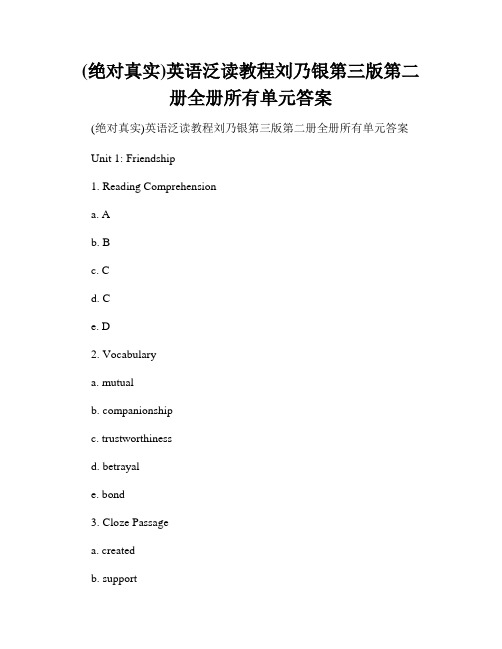
(绝对真实)英语泛读教程刘乃银第三版第二册全册所有单元答案(绝对真实)英语泛读教程刘乃银第三版第二册全册所有单元答案Unit 1: Friendship1. Reading Comprehensiona. Ab. Bc. Cd. Ce. D2. Vocabularya. mutualb. companionshipc. trustworthinessd. betrayale. bond3. Cloze Passagea. createdb. supportd. conflictse. maintaining4. Sentence Completiona. enrichingb. overcomec. sincerityd. regarde. valuableUnit 2: Environment1. Reading Comprehensiona. Cb. Ac. Dd. Ce. B2. Vocabularya. sustainableb. pollutiond. conservatione. renewable3. Cloze Passagea. reduceb. consumptionc. responsibled. environmente. consequences4. Sentence Completiona. devastatingb. preservingc. initiativesd. diminishe. CooperatingUnit 3: Health1. Reading Comprehensiona. Db. Cc. Bd. Ae. D2. Vocabularya. physicalb. psychologicalc. wellbeingd. lifestylee. nutritious3. Cloze Passagea. maintainingb. balancec. incorporated. emotionale. detrimental4. Sentence Completiona. optimizingb. boostc. resilienced. combatinge. meditationUnit 4: Technology1. Reading Comprehensiona. Bb. Dc. Ad. Ce. B2. Vocabularya. innovationb. accessiblec. efficiencyd. advancemente. revolutionize3. Cloze Passagea. enhanceb. productivityc. revolutione. convenience4. Sentence Completiona. transformb. revolutionizedc. autonomousd. facilitatee. paramountUnit 5: Education1. Reading Comprehensiona. Cb. Dc. Bd. Ae. D2. Vocabularya. acquireb. literacyc. curriculume. scholarship3. Cloze Passagea. accessibleb. intellectualc. acquired. foundatione. diverse4. Sentence Completiona. Invaluableb. interactc. impartingd. extensivee. elevateNote: This answer key is based on the third edition of the English Reading Tutorial by Liu Naiyin, Book 2. Please consult your teacher or refer to the textbook for further clarification on any answers.。
英语泛读教程3第三版(刘乃银)答案

Home Reading:
cdacd ddc
Unit 13
Text:
A. c B. cdcad bab D. cbada cabdb Fast Reading:
cdacc caccd bdbdb
Home Reading:
bdbcc bdd
Unit 14
Text:
A. c B. ddcad dab D. dacad babad b
英语泛读教程3第三版刘乃银版答案
Unit 1
Text:
A. c B. bdabb ddc D. addad cdb
Fast Reading:
dbdda abaad cbbdc
Home Reading:
dacdd aab
Unit 2
dcbca bccbc bcddd
Home Reading:
dcdca bd
Unit 10
Text: A. c B. cdccd bacac D. dcdbc acadc bd
Fast Reading:
dbdcc dccdb bddca
A. d B. acbda dcaac D. abaac daccd ad
Fast Reading:
daada cddbc bdcdb
Home Reading:
cbadb cddbc
Unit 8
Text:
A. c B. cddcc dccb D. abdac aaa
bcadb bcddd
Unit 12
Text:
A. b B. bbbdd ccc D. cdccd acdba dca
(完整版)(绝对真实)英语泛读教程刘乃银第三版第二册全册所有单元答案

Book 2-Unit 2
▪ Text:
▪ A. d
▪ B. 1-5: bddbd
6-10: dbdad
▪ C. 1-5: abadd
6-10: caacc
▪ Fast Reading:
▪ 1-5: bbcad 6-10: bbbdd 11-15: cddda
▪ Home Reading:
▪ 1-5: abadc 6-10: adbcd
11-15: abccd
Book 2-Unit 12
▪ Text: ▪ A. a ▪ B. 1-5: ccaaa 6-8: ccb ▪ C. 1-5: abada 6-10: bbccd ▪ Fast Reading: ▪ 1-5: cacdd 6-10: cdbdb 11-15: bccac ▪ Home Reading: ▪ 1-5: bcc cd 6-10: cadbb
Book 2-Unit 13
▪ Text: ▪ A. b ▪ B. 1-5: dbcbd 6-8: aad ▪ C. 1-5: cadca 6-10: bdaca 11-12: db ▪ Fast Reading: ▪ 1-5: acdbd 6-10: baacd 11-15: dddba ▪ Home Reading: ▪ 1-5: dccdb 6-10: bcdab
Book 2-Unit 8
Hale Waihona Puke ▪ Text: ▪ A. b ▪ B. 1-5: badda 6-8: baa ▪ C. 1-5: dacdc 6-10: abbda ▪ Fast Reading: ▪ 1-5: cdbbd 6-10: dcacb ▪ Home Reading: ▪ 1-5: accbd 6-10: bacdb
泛读教程-第三册-Unit-2--答案PPT课件

Skimming
2
Contents
Speed Reading Speed Techniques What is Skimming When to SKIM How to SKIM
3
Reading Speed
800
600 300 150
20
Phrase reading is a technique that builds fluency, aids comprehension, and improves oral reading.
7
Techniques for Speed Reading
How to Phrase Read
Group words that naturally go together To Read efficiently you should try to get rid of bad reading habits and get into good ones Group words together into meaningful units Studying economics is difficult because it requires careful attention to facts and figures
14
❖Skimming is the reading style used by flexible readers when their purpose is to quickly obtain a general idea about the reading material. The Skimming style is most useful when you have to read a large amount of material in a short amount of time. When using the Skimming style, you should identify the main ideas in each paragraph and ignore the details in supportive sentences. Because you are only looking for the main idea in each paragraph you read, a lower level of comprehension is to be expected than when using the Study Reading style
《英语泛读教程刘乃银第三版第二册》单元词汇学习要点
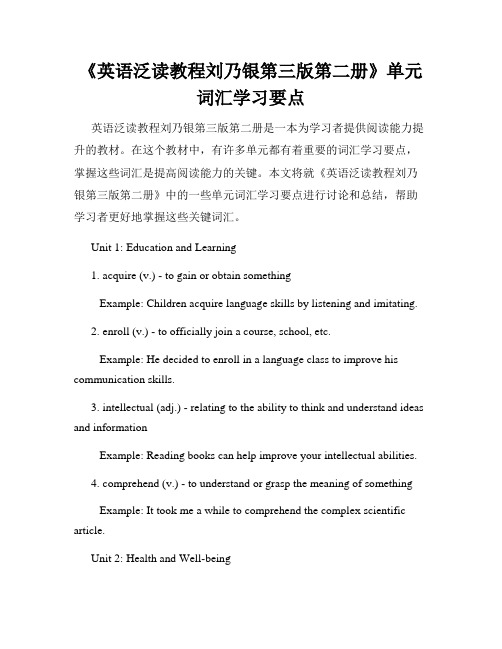
《英语泛读教程刘乃银第三版第二册》单元词汇学习要点英语泛读教程刘乃银第三版第二册是一本为学习者提供阅读能力提升的教材。
在这个教材中,有许多单元都有着重要的词汇学习要点,掌握这些词汇是提高阅读能力的关键。
本文将就《英语泛读教程刘乃银第三版第二册》中的一些单元词汇学习要点进行讨论和总结,帮助学习者更好地掌握这些关键词汇。
Unit 1: Education and Learning1. acquire (v.) - to gain or obtain somethingExample: Children acquire language skills by listening and imitating.2. enroll (v.) - to officially join a course, school, etc.Example: He decided to enroll in a language class to improve his communication skills.3. intellectual (adj.) - relating to the ability to think and understand ideas and informationExample: Reading books can help improve your intellectual abilities.4. comprehend (v.) - to understand or grasp the meaning of somethingExample: It took me a while to comprehend the complex scientific article.Unit 2: Health and Well-being1. nutrition (n.) - the process of providing or obtaining the food necessary for health and growthExample: A balanced diet is important for good nutrition.2. consume (v.) - to eat, drink, or ingest food or drinkExample: It is recommended to consume at least five servings of fruits and vegetables a day.3. immune (adj.) - protected against a particular disease or conditionExample: Regular exercise can help strengthen the immune system.4. diagnose (v.) - to identify the cause of a problem or illness through examination and analysisExample: The doctor was able to diagnose the patient's illness after running several tests.Unit 3: Environment and Sustainability1. pollution (n.) - the presence of harmful substances in the environmentExample: Air pollution can have negative effects on people's respiratory health.2. renewable (adj.) - able to be replenished or replaced naturally or by human effortExample: Solar and wind energy are examples of renewable energy sources.3. conservation (n.) - the protection and preservation of the environment and its resourcesExample: The national park has strict rules in place to ensure the conservation of wildlife.4. sustainability (n.) - the ability to maintain or support something at a certain level or rateExample: The construction industry is striving for sustainability through the use of eco-friendly materials.Unit 4: Society and Culture1. diversity (n.) - the state or condition of being different or variedExample: Our school promotes cultural diversity and encourages students to learn from one another.2. tradition (n.) - a custom or belief that has been passed down from generation to generationExample: The Lunar New Year celebration is a tradition celebrated by many Asian cultures.3. prejudice (n.) - preconceived opinion or judgment about a person or group without proper examination of the factsExample: Racism is a form of prejudice that should be actively combated.4. customs (n.) - traditional practices or habits of a particular society or communityExample: Different countries have their own unique customs and traditions.文章格式:根据《英语泛读教程刘乃银第三版第二册》单元的内容特点,本文采用了单元和词汇学习要点的形式来组织文章。
完整英语课文翻译 泛读教程2第三版(刘乃银)

第一单元:梦想的阴暗之面艾力克斯? 哈利许多人怀有美好的愿望,期望能成为作家,但是能够梦想成真的人不多。
艾力克斯? 哈利也想成为作家,可是他成功了。
阅读下面这篇文章,看一看他成功的原因。
许多青年人对我说,他们想成为作家。
我一直鼓励这样的人,但是我也向他们解释“成为作家”和写作之间存在着巨大的差别。
多数情况下这些年轻人梦寐以求的是财富与名誉,从未想到要孤身一人长久地坐在打字机旁。
“你们渴望的应该是写作,”我对他们说,“而不应该是当作家。
”事实上,写作是一项孤单寂寞而又收入微薄的工作。
有一个被命运之神垂青的作家,就有成千上万个永远无法实现梦想的人。
即使那些成功人士也经常受到长久的冷落,穷困不堪。
我便是其中之一。
我放弃了在海岸警卫队做了二十年的工作,为的是成为一名自由撰稿人,这时,我根本没有前途可言。
我所拥有的只是一位住在纽约市的朋友,乔治? 西姆斯,他和我是在田纳西州的赫宁一起长大的。
乔治为我找了个家,位于格林威治村公寓大楼中的一间腾空的储藏室,而他是那幢大楼的管理员。
房子里冷嗖嗖的,没有卫生间,不过这没什么。
我马上买了一台旧的手动打字机,感觉自己颇象一位名符其实的作家。
然而,大约一年后,我的写作生涯依然没有任何起色,我开始怀疑自己。
卖出一篇小说是如此艰难,以至我几乎填不饱肚子。
但是,我清楚的是我想写作,我已梦寐以求了许多年。
我并不准备成为一名到死时还在想假如的人。
我会坚持把我的梦想付诸实践-- 即使这梦想意味着不稳定的生活和对失败的恐惧。
这是希望的阴暗面,任何心存梦想的人都必须学会在这阴暗面下生存。
后来有一天,我接到了一个电话,由此改变了我的一生。
这并不是一位代理人或编辑打来电话,主动要求与我签大的稿约。
恰恰相反-- 是一声鸣笛,诱使我放弃梦想。
打电话来的是海岸警卫队的老熟人,现在在旧金山。
他曾经借给我几美元,喜欢催我还给他。
“我什么时候才能拿到那十五美元,艾力克斯?”他逗我说。
“等我下一次卖出作品吧。
英语泛读教程刘乃银第三版第二册全册所有单元答案

6-8:cdd 6-10: dadca 6-10: cbbcd
6-8: bac
Book 2-Unit 2
▪ Text:
▪ A. d
▪ B. 1-5: bddbd 6-10: dbdad
▪ C. 1-5: abadd
6-
10: caacc
▪ Fast Reading:
▪ 1-5: bbcad 11-15: cddda
11-12: db
▪ Fast Reading: ▪ 1-5: acdbd
11-15: dddba
▪ Home Reading: ▪ 1-5: dccdb
6-8: aad 6-10: bdaca
6-10: baacd
6-10: bcdab
Book 2-Unit 14
▪ Text:
▪ A. d
▪ B. 1-5: ddcda
6-10: ddcaa 6-10: bbcda
6-10: abdcb
6-9: ddad
Book 2-Unit 4
▪ Text:
▪ A. c
▪ B. 1-6: bdcaab
▪ C. 1-5: dbadb 11-12: cb
6-10: ccdcd
▪ Fast Reading:
▪ 1-5: cdabd 6-10: cdcdd 11-15: dccbb
6-10: cdddb 6-7: cb 6-10: bacbd
6-9: cdad
Book 2-Unit 10
▪ Text: ▪ A. d ▪ B. 1-5: cdabc ▪ C. 1-5: accac
11-12: dd
▪ Fast Reading: ▪ 1-5: cdbcd
《英语泛读教程刘乃银第三版第二册》完型填空题目详解
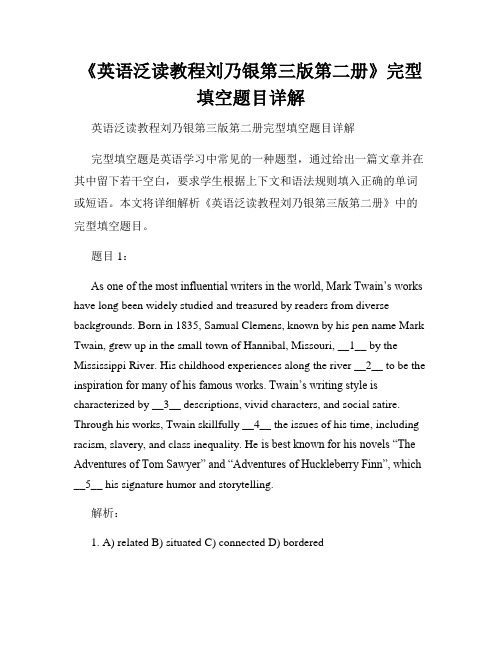
《英语泛读教程刘乃银第三版第二册》完型填空题目详解英语泛读教程刘乃银第三版第二册完型填空题目详解完型填空题是英语学习中常见的一种题型,通过给出一篇文章并在其中留下若干空白,要求学生根据上下文和语法规则填入正确的单词或短语。
本文将详细解析《英语泛读教程刘乃银第三版第二册》中的完型填空题目。
题目 1:As one of the most influential writers in the world, Mark Twain’s works have long been widely studied and treasured by readers from diverse backgrounds. Born in 1835, Samual Clemens, known by his pen name Mark Twain, grew up in the small town of Hannibal, Missouri, __1__ by the Mississippi River. His childhood experiences along the river __2__ to be the in spiration for many of his famous works. Twain’s writing style is characterized by __3__ descriptions, vivid characters, and social satire. Through his works, Twain skillfully __4__ the issues of his time, including racism, slavery, and class inequality. He is best known for his novels “The Adventures of Tom Sawyer” and “Adventures of Huckleberry Finn”, which __5__ his signature humor and storytelling.解析:1. A) related B) situated C) connected D) bordered根据文章描述,Mark Twain成长于密西西比河边的小镇Hannibal, Missouri,所以答案选B) situated。
泛读教程 第三册 Unit 2 课件 答案

How to locate key words
Using Sentence Structure
Using Grammatical Structure
Using Typographic al Aids
Rereading
Rereading established the mechanical process of more rapid eye movement and gives you preliminary practice or a “trial run” with reading at a higher reading rate. 1. Select an article read at your normal speed. Time yourself. 2.Take a break, then reread the material. Push yourself to read faster. Time yourself.
Skimming is the reading style used by flexible readers when their purpose is to quickly obtain a general idea about the reading material. The Skimming style is most useful when you have to read a large amount of material in a short amount of time. When using the Skimming style, you should identify the main ideas in each paragraph and ignore the details in supportive sentences. Because you are only looking for the main idea in each paragraph you read, a lower level of comprehension is to be expected than when using the Study Reading style
泛读教程第三册第二单元
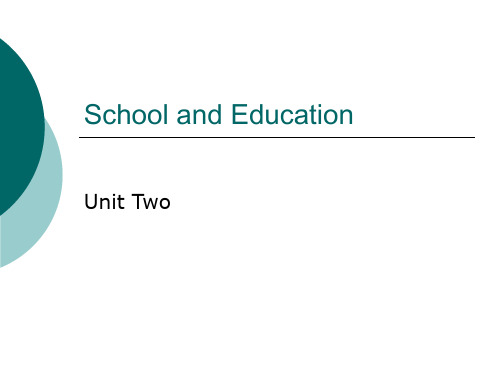
Pt IV: 12
The conclusion and calling on action
Paraphrase
1. The kids are hanging out. I pass small bands of once-and-future students on my way to work these mornings. 2. The calendar called the school year ran out on them a few weeks ago. 3. Like others who fall through the cracks of their parents‘ makeshift plans – a week with relatives, a day at the playground – they hang out.
Paraphrase
4. For much of our history, after all, Americans framed the school year around the needs of work and family. 5. The six-hour day, the 180-day school year is regarded as something sacrosanct. 6. Dr. Boyer is one of many who believe that radical revision of the school calendar is inevitable. ―School, whether we like it or not, is custodial and educational.‖
(绝对真实)英语泛读教程刘乃银第三版第二册全册所有单元答案_图文

Book 2-Unit 2
Text:
A. d
B. 1-5: bddbd
6-10: dbdad
C. 1-5: abadd
6-10: caacc
Fast Reading:
1-5: bbcad 6-10: bbbdd 11-15: cddda
Home Reading:
1-5: abadc 6-10: adbcd
Book 2-Unit 3
Text: A. c B. 1-5: bccad 6-10: ddcaa C. 1-5: badcd 6-10: bbcda 11-12: cb Fast Reading: 1-5: dbacc 6-10: abdcb 11-15: bdabc Home Reading: 1-5: cadcc 6-9: ddad
Book 2-Unit 8
Text: A. b B. 1-5: badda 6-8: baa C. 1-5: dacdc 6-10: abbda Fast Reading: 1-5: cdbbd 6-10: dcacb Home Reading: 1-5: accbd 6-10: bacdb
(绝对真实)英语泛读教程刘乃银第三版第二册 全册所有单元答案_图文.ppt
Book 2-Unit 1
Text: A. d B. 1-5: baccd 6-8:cdd C. 1-5: daaba 6-10: dadca Fast Reading: 1-5: dbcc a 6-10: cbbcd 11-15: dcdcd Home Reading: 1-5: abccc 6-8: bac
11-15: cdccd
《英语泛读教程刘乃银第三版第二册》阅读理解题目详解
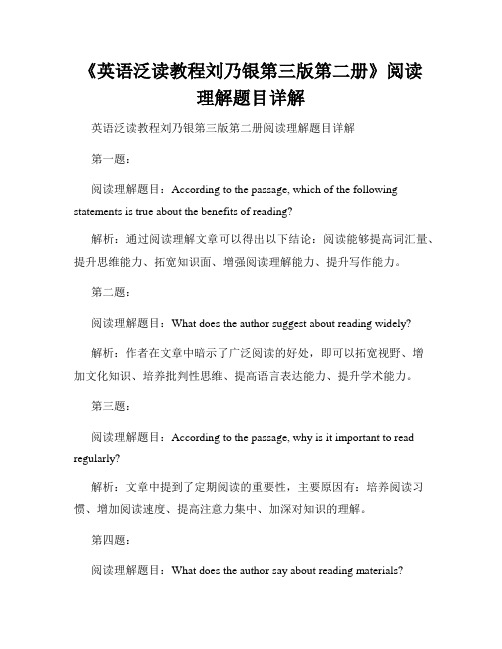
《英语泛读教程刘乃银第三版第二册》阅读理解题目详解英语泛读教程刘乃银第三版第二册阅读理解题目详解第一题:阅读理解题目:According to the passage, which of the following statements is true about the benefits of reading?解析:通过阅读理解文章可以得出以下结论:阅读能够提高词汇量、提升思维能力、拓宽知识面、增强阅读理解能力、提升写作能力。
第二题:阅读理解题目:What does the author suggest about reading widely?解析:作者在文章中暗示了广泛阅读的好处,即可以拓宽视野、增加文化知识、培养批判性思维、提高语言表达能力、提升学术能力。
第三题:阅读理解题目:According to the passage, why is it important to read regularly?解析:文章中提到了定期阅读的重要性,主要原因有:培养阅读习惯、增加阅读速度、提高注意力集中、加深对知识的理解。
第四题:阅读理解题目:What does the author say about reading materials?解析:作者指出了关于阅读材料的一些观点,包括:选择适合自己水平的材料、多样化选择阅读材料、挑战自己阅读水平。
第五题:阅读理解题目:What is the main purpose of the text?解析:文章的主要目的是介绍阅读的好处、强调广泛阅读的重要性、提醒人们定期阅读、给出关于阅读材料的建议。
总结:通过阅读理解题目的解析,我们可以对英语泛读教程刘乃银第三版第二册的内容有更深入的理解。
阅读对于提高语言能力、拓宽知识面、培养思维能力等方面都有积极的影响,因此我们应该定期进行阅读,并选择适合自己水平的材料进行广泛阅读。
阅读不仅仅是为了增加词汇量和阅读理解能力,更重要的是培养起批判性思维、提高学术能力和语言表达能力。
英语泛读教程3---UNIT2(刘乃银)
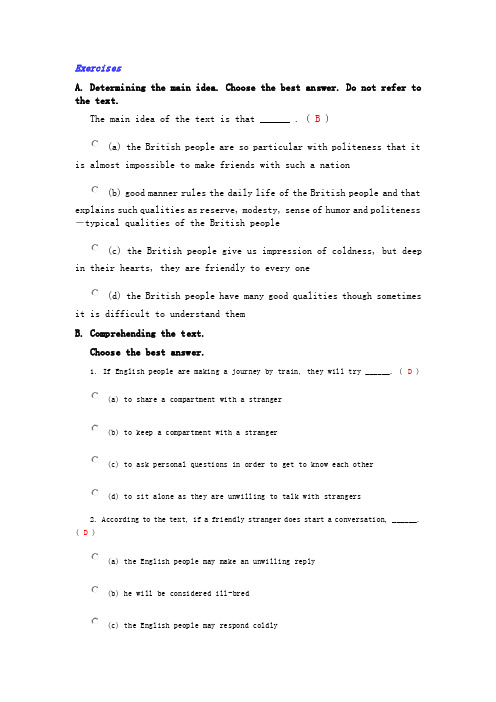
ExercisesA. Determining the main idea. Choose the best answer. Do not refer to the text.The main idea of the text is that ______ . ( B )(a) the British people are so particular with politeness that it is almost impossible to make friends with such a nation(b) good manner rules the daily life of the British people and thatexplains such qualities as reserve, modesty, sense of humor and politeness -typical qualities of the British people(c) the British people give us impression of coldness, but deep in their hearts, they are friendly to every one(d) the British people have many good qualities though sometimes it is difficult to understand themB. Comprehending the text.Choose the best answer.1. If English people are making a journey by train, they will try ______. ( D )(a) to share a compartment with a stranger(b) to keep a compartment with a stranger(c) to ask personal questions in order to get to know each other(d) to sit alone as they are unwilling to talk with strangers2. According to the text, if a friendly stranger does start a conversation, ______. ( D )(a) the English people may make an unwilling reply(b) he will be considered ill-bred(c) the English people may respond coldly(d) his friendliness may please the English people3. The self-disapproval and modesty of the English people ______. ( B )(a) is understandable to most foreigners(b) often results in misunderstanding(c) shows that t hey don’t really care about anything(d) is considered bad behavior4. The ideal of English sense of humor is ______. ( C )(a) to laugh at other's failures(b) to show sympathy to a tragedy(c) to laugh at oneself(d) a disrespectful attitude towards life5. We may well guess from the text that English people ______. ( D )(a) do not always obey rules of sport(b) are good at playing tennis(c) are bad-tempered when defeated(d) show respect for other people’s feelings6. The starting point of politeness in Britain is________. ( C )(a) a positive attitude to life(b) to show hospitality to others(c) to show consideration for each other(d) to please other people7. “Would you mind if I open the window?” A polite answer to the question is ______ ( C )(a) “No, please.”(b) “Yes.”(c) “Of course not.”(d) “Please do.”8. Politeness towards women and old people is based on ______. ( A )(a) the feeling that they are in need of protection(b) the fact that they are physically weak(c) their actual need(d) the feeling that they are more experiencedC. Understanding vocabulary.Choose the correct definition according to the context.1. Similarly, conversation in Britain is in general quiet and restrained and loud speech is considered ill-bred. ( B )(a) quick-tempered(b) badly-behaved(c) thoughtless(d) healthy2. On the other hand, they are perfectly human behind their barrier of reserve, and may be quite pleased when a friendly stranger or foreigner succeeds for a time in breaking the barrier down. ( A )(a) destroying(b) interrupting(c) separating(d) protecting3. Within their hearts, the English are perhaps no less conceited than anybody else, but in their relations with others they value at least a show of modesty. ( D )(a) modest(b) cool(c) excited(d) self-important4. This attitude is never cruel or disrespectful or malicious. ( D )(a) deceptive(b) keen(c) critical(d) hateful5. Women especially, for reasons of sexual attraction, long to “stay young” and there is no greater compliment to a mature woman than to be told “How young you look!” ( A )(a) praise(b) prudence(c) concern(d) help6. Rules are the essence of sport, and sportsmanship is the ability to practise a sport in obedience to its rules, whil e also showing generosity to one’s opponent and good temper in defeat. ( C )(a) friend(b) enemy(c) rival(d) master7. When the request is granted, and at any time when you are receiving something, however obviously you are entitled to it, you are always expected to say “Thank you”. ( A )(a) have the right to(b) are worthy of(c) are respected for(d) are opposed to8. It is still considered polite to give up one’s seat to a woman who is standing, to open doors for her, help her alight from the bus. ( A )(a) get off(b) get on(c) keep away(d) sit away9. Old age and seniority alone do not command authority. ( C )(a) being expert(b) high rank(c) higher standing through long service(d) modestyD. Discussing the following topics.1. According to the British standard, what sort of behaviors are considered rude?答案Troubling someone without saying "Excuse me" or disturbingsomeone without expressing regret. Also, when you receivesomething or when others have done you a favor, it is impolitenot to express your appreciation. Direct requests or actions thatinvolve inconvenience are not proper. (More examples of this sortof behavior are expected to be found by yourself.)2. What is your general impression of politeness in Britain?答案Politeness in Britain is based on the elementary rule of showing consideration for others, and acknowledging theconsideration they show to you. This is a reasonable social rule.Western civilization is famous for its politeness towards women,the idea of which originates from the inequality between men andwomen. This politeness is less observed today as women have becomeequal with men in many aspects. Old people are respected inBritain because they are felt to be in need of protection andsupport, the idea of which is different from that of the Chinesepeople who respect the aged not merely because they needprotection but also because they are worthy of the respect.PracticeA. Read each headline in the left column and decide what kind of a story it introduces. Match the headline with the most suitable story category in the right column.g )Job-hunting made worse a. A Decisione )Old feud flares anew b. A Treaty Signingc )Gov't. to launch probe intoc. An Investigationdisasterb )UK, Iceland to ink fishingd. A Criticismpact?d )Parents rap schoole. A Disputeadministrationf )Faulty power line triggersfactory blazef. A Firea ) Rate of wage rises slows g. An Disappointmentg ) Blow for old folkB. Give the full name or form of the following.Aussie( Australia )lib( liberation )pix( pictures )tech( technology )vet( veteran )rep( representative )biz( business ) grad( graduate )sec( secretary )nat'l( national )com'l( commercial )c'tee( committee )UNESCO( United Nations Educational,Scientific and Cultural Organization) OPEC( Organization of Pretroleum Exporting Countries )WTO( World Trade Organization )ASEAN( Association of Southeast Asian Nations )IOC( International Olympic Committee )WHO( World Health Organization )VIP( very important person )DJI( Dow-Jones Index )P assage OneThree passions, simple but overwhelmingly strong, have governed my life: the longing for love, the search for knowledge, and unbearable pity for the suffering of mankind. These passions, like great winds, have blown me hither and thither, in a wayward course, over a deep ocean of anguish, reaching to the very verge of despair.I have sought love, first, because it brings ecstasy - ecstasy so great that I would often have sacrificed all the rest of life for a few hours of this joy. I have sought it, next, because it relieves loneliness - that terrible loneliness in which one shivering consciousness looks over the rim of the world into the cold unfathomable lifeless abyss. I have sought it, finally, because in the union of love I have seen, in a mystic miniature, the prefiguring vision of the heaven that saints and poets have imagined. This is what I sought, and thought it might seem too good for human life, this is what - at last - I have found.With equal passion I have sought knowledge. I have wished to understand the hearts of men. I have wished to know why the stars shine...A little of this, but not much, I have achieved.Love and knowledge, so far as they were possible, led upward toward the heavens. But always pity brought me back to earth. Echoes of cries of pain reverberate in my heart. Children in famine, victims tortured by oppressors, helpless old people a hated burden to their sons, and the whole world of loneliness, poverty, and pain make a mockery of what human life should be. I long to alleviate the evil, but I cannot, and I too suffer. This has been my life. I have found it worth living, and would gladly live it again if the chance were offered me.(302 words)1.The passage, taken from Bertrand Russell’s (1872-1970) autobiography, is mainly about Russell’s ______ .( D )(a) longing for love(b) search for knowledge(c) unbearable pity for the suffering of mankind(d) three passions that governed his life2. In the first paragraph, Russell says that ________ .( B )(a) he longs for love and never despairs(b) he has pity for the suffering of mankind and often feels anguish(c) he has traveled over a great ocean for the three passions(d) the result of his search is despair3. In the second paragraph, Russell thinks that he has found in his search for love all the following EXCEPT ________. ( B )(a) great joy(b) loneliness(c) the vision of the heaven(d) relief from solitariness4. Regarding knowledge, Russell thinks that ________ . ( D )(a) he knows why the stars shine(b) he understands the hearts of men(c) he has a good knowledge of things(d) he has succeeded a bit but not much5. Whenever Russell thinks of the sufferings of mankind, he __________. ( C )(a) is mocked by human life(b) becomes lonely(c) suffers too(d) feels he goes upward toward theheavens TOPP assage TwoIt is almost a definition of a gentleman to say he is one who never inflicts pain. This description is both refined, and as far as it goes, accurate. He is mainly occupied in merely removing the obstacles which hinder the free and unembarrassed action of those about him, and he concurs with their movements rather than takes the initiative himself. The true gentleman carefully avoids whatever may cause a jar or a jolt in the minds of those with whom he is cast - all clashing of opinion, or collision of feeling, all restraint, or suspicion, or gloom, or resentment; his great concern being to make everyone at their ease and at home. He has his eyes on all his company, he is seldom prominent in conversation, and never wearisome. He makes light of favors while he does them, and seems to be receiving when he is conferring. He never speaks of himself except when compelled, never defends himself by a mere retort, he has no ears for slander or gossip, is scrupulous in imputing motives to those who interfere with him, and interprets everything for the best. He is never mean or little in his disputes, never takes unfair advantage, never mistakes personalities or sharp sayings for arguments, or insinuates evil which he dare not say out.He has too much good sense to be affronted at insults, he is too well employed to remember injuries, and too indolent to bear malice. He is patient, forbearing, and resigned, on philosophical principles; he submits to pain because it is inevitable, to bereavement because it is his destiny. He may be right or wrong in his opinion, but he is too clear-headed to be unjust; he is as simple as he is forcible, and as brief as he is decisive. Nowhere shall we find greater candor, consideration, indulgence; he throws himself into the minds of his opponents, he accounts for their mistakes. He knows the weakness of human reason as well as its strength, its province and its limits.(336 words)6. According to the writer of the passage, a gentleman _______. ( B )(a) feels it his responsibility to show what people should do(b) avoids clashes of opinions or feelings(c) studies carefully the obstacles in the way of free and unembarrassed people(d) always thinks of those about him7. The author thinks that when a gentleman talks with others, ______ . ( D )(a) he shows his skill at conversation(b) he likes to help others with his favors(c) he prefers receiving favors rather than offering them(d) he seldom speaks of himself8. A gentleman, as defined in the passage, ______ . ( B )(a) never takes advantage while disputing with others(b) never makes personal attacks(c) is interested in slander and gossip(d) interprets people’s action as they really are9. Faced with insults, injuries and malice, a gentleman will _______ . ( D )(a) feel angry(b) learn them by heart(c) keep him busy to forget them(d) pay little attention to them10. A good title for the passage is : ______ . ( B )(a) Is There Such a Gentleman?(b) The Definition of a Gentleman(c) What a Gentleman Will Do.(d) An IdealizedGentleman. TOPP assage ThreeMy favorite English teacher could draw humor out of the driest material. It wasn't imposed either. He took Samuel Johnson's dictionary, Addison's essays, and many other literary wonders from the eighteenth century and made them hilarious, even at eight o'clock in the morning. The thing that amazed me most was that the first time I read these works on my own some of them seemed dead, but the second time, after his explanation, I couldn't believe that I hadn't seen the humor. The stories and poems and plays were suddenly filled with irony and allusions and hilarious moments. I learned more from him than from any other teacher.My least favorite English teacher also made people laugh. Some students found him to be wonderfully funny. Many others did not. He assigned journals over a six week period, to be written in every day. At the end of the six weeks I had a notebook full of jotted ideas, short story fragments, reactions to what we had read, and so on. Our teacher announced that we would be grading each other's journals. Mine was passed to Joe, the class clown, who saw it fit to quip at the end of it, “This writing isn't fit to line the bottom of a birdcage.” Our teacher laughed at that. Funny stuff. It hurt me so much that the anger from it has driven my writing and teaching ever since.So what makes the difference? Humor is one of the most powerful tools teachers (or writers) have at their disposal. It can build up studentsand classes and make them excited about literature and writing, or it can rip them apart.(276 words)11. The above passage discusses _______________ . ( C )(a) teaching(b) literature(c) humor(d) knowledge12. The word “hilarious” means ______ .( D )(a) brilliant(b) weary(c) exciting(d) funny13. With his favorite English teacher, the writer found it most amazing that __________ . ( D )(a) his teacher was very learned(b) his teacher was very humourous(c) the works by Johnson and Addison were very humourous(d) he had not been able to find humor in works by Johnson and others14. The English teacher the writer disliked most ________. ( B )(a) was not able to make people laugh(b) hurt his students’ feelings by laughing(c) didn’t let his students do the grading(d) had no sense of humor15. According to the writer, humor ________. ( D )(a) helps teachers in their work(b) helps students in their studies(c) is something hard to define(d) can be either productive or counterproductiveText 2ExercisesDoes Anybody Really Care?Edgar DaleThis cry of despair is more common than we may realize. Some of us speak these words rarely; others say them every day - silently or aloud. To hear the cry for help requires extra-sensitive perception. We can hear it only if we listen with the third ear, a trenchant phrase of Theodore Reik.For example, I often visited a Negro friend in a home for the elderly. The place was sterilized and the environment was sterile. My friend was old, dispirited, and he wanted to die. He often said, "I'm a lost ball in the tall weeds." He felt unfulfilled. He knew that if he had been white, he could have been a successful professional man. "I think about this every day of my life," he said. Who cared about this Negro workman who had helped erect many buildings in downtown Columbus? Hardly anyone.We have been remiss both in caring for and caring about the elderly. Perhaps they suggest too strongly our own morality, the guilt we may deservedly or undeservedly feel about our own aging parents. The Great Society needs a more creative approach to what are euphemistically called the golden years. The program of the First Community Village in Columbus, Ohio, and other similar centers may be a happy augury of things to come. Edna St. Vincent Millay once said, "O world, I cannot hold thee close enough!" To care for people is to wish to be close to them, in theirpresence, to penetrate the mask we all wear. It is interesting that our comments about communication with other people include such expressions as "We were very close," "I was deeply touched," "He was greatly affected." To care deeply for persons is to see them not as plumbers, scientists, clerks, lawyers, mathematicians, or as white, yellow, or black. It is to see them as unique individuals with all their idiosyncrasies, strengths, and weaknesses, their similarities and differences. Caring is color-blind, uncalculating.To care or not to care is a problem of communication. Sol, the instrument maker in Dombey and Son talked to his nephew about Mr. Dombey. The nephew said, "I thought he didn't seem to like me very much." "You mean, I suppose," Sol replied, "that you didn't seem to like him very much." When the mutuality of caring does not take place, we often put the burden of its absence on the other fellow. We may thus hide our true feelings.Indeed, the popularity of the mask as an art form in all cultures suggests that we have a public face and a private face. Interestingly enough, the word "personality" comes from persona, meaning "an actor's mask." We ask reporters who know public figures intimately, "What is he really like?" Many articles appear with the heading, "What is the real John Smith like?"Perhaps our wish to unmask others but to remain masked ourselves betrays a fear that our weaknesses will be discovered and disapproved. And conversely, the revelation of our hidden strengths may appear boastful. Sometimes, too, we do not want to disclose openly our unfriendly attitude because it is socially unacceptable. When we are rejected by someone, we tend to say, "I couldn't care less," meaning "I couldn't care more." Or we may not want to reveal even to ourselves that we care deeply about someone, for fear of rejection.The wounds of rejection go very deep. Shakespeare said, "He jests at scars that never felt a wound." But even those who have been deeply hurt do not automatically learn to care for others in the same predicament. For example, a North Carolina high school boy was doing badly in his classes, and felt that no one really cared. The director of audiovisual instruction asked the boy to help build a high school radio studio. He did this skillfully and joyously, and his whole attitude seemed to change. But one day he said to my friend, "You know, some day I want to be a teacher." When asked "Why?" he replied, "Because I want to make other kids suffer like I have suffered." His wounds were only partially healed. All caring has hazards and the outcomes are uncertain. To care for others and to let them care for us is a creative experiment in communication in which we may get hurt. But the price paid, the risk of being wounded,is the price of all communication. It is because we ourselves are hurt that we can understand the Oliver Wendell Holmes, "Aman must share the sorrows and joys of those around him under pain of not having lived."Some cannot exchange love because they are emotionally and psychologically barricaded against loving and being loved. Dostoevski has Father Zossima say, "Hell... is the suffering of being unable to love." This inability to care for others, to love and be loved, is a theme of many great books. Dombey, for example, could not communicate with his young daughter Florence. Of this, Charles Dickens writes:"There were some children staying in the house. Children who were as frank and happy with fathers and with mothers as those rosy faces opposite their home. Children who had no restraint upon their love, and freely showed it. Florence sought to learn their secret; sought to find out what it was she had missed; what simple art they knew, and she knew not; how she could be taught by them to show her father that she loved him, and to win his love again."Florence could give love but her father was unable to receive it from her.How do we learn to care for others and to welcome their caring for us? How can we develop children who have "no restraint upon their love and freely show it?" The translation of a desired value into reality is not simple. T.S. Eliot has pointed out thatBetween the ideaAnd the reality...Between the motionAnd the actFalls the Shadow.How can we discipline ourselves to make the dream a reality?As teachers and parents we can talk less and listen more. We need more sensitive antennas. We are not picking up the faint signals of discouragement, concealed anger or fear of failure. The voice of despair may be weak and need amplification. And we must get these messages early, before they explode into violence and we shall be compelled to listen to angry shouting.It is not hard to care for people who are very much like ourselves. This is a form of self-admiration, narcissism. But it requires rigorous self-discipline to be concerned with, to care about those who are different. It is difficult to care for someone thousands of miles away, or for those at hand who do not act or dress conventionally - theso-called hippies, for example. We must ask, "What are they trying to say?" Are they asking, "Does anyone really care?"Is it possible that we are rejecting the ideas of young people in the guise of rejecting their style of dress?Remember, too, that conventional dress changes, as every woman knows. If we don't admire a person who iswearing a beard, long hair, and sandals, we must ask whether we would prefer to see Christ pictured with his shoes shined, his hair cut short, and clean-shaven. I have a friend who has a beard and who puts up his long hair like a woman. I might add that he is an Indian, a Sikh.We also have difficulty understanding people whose food habits are different than ours. However, the man who thinks it strange to eat raw fish as they do in Japan is fond of oysters on the half-shell. Some who think that bird's nest soup is "for the birds" enjoy eating the gelatin that comes from boiling the skins and bones of animals. And those cheeses that we like so well are made from milk that has stood long enough to putrefy. We do not use this word, however, but prefer nicer terms such as ferment, cure, or ripen.Caring develops best on a plane of quality, of mutuality. We unconsciously assume that our way of life is superior; that of other people's, inferior. I once heard a distinguished network broadcaster end an interview with some able foreign students by suggesting that on their return to their own countries they "spread the American way of life." How would he feel if, after visiting England, he was asked to spread the British way of life in the United States?We have expected gratitude from foreign countries for our gifts and loans. Look what we have done for them! But strong bonds of mutuality are not built in this way. Instead, they require that we care enough about people to do things with them rather than for them. Giving as unequals, we can easily develop an attitude of patronizing, immodestself-congratulation. We like to help the underdog, forgetting that this places us in the role of the overdog, the person who has the power to grant or to withhold favors.Are children grateful for what their parents do for them? They should be, considering how often they have heard about it. But caring and loving must not be evaluated too soon. Caring takes time. Love is patient.Caring must be learned. Children in the same family may differ markedly in their willingness and ability to share friendship and affection. Bonnie, at the age of three, already has a charm and grace in human relationships that her older brother still lacks. A seven-year-old boy announces that he will not give money to the Junior Community Chest. "There's something peculiar about it," he says. So his nine-year-old brother gives for both of them.No one expects to master the skills of tennis, basketball, or the dance by a few easy lessons. Hundreds, yes thousands, of hours of grueling, skillfully coached practice are necessary. Is it any different in matters of delicate human relationships? Caring requires the same disciplined practice.Are children and young people in school mastering the art of caring? Are the current heavy emphases on formal subject matter, on competitionto get into college or graduate school resulting in more impersonal relationships between teacher and students? Are newer tools of technology which can be used with large groups actually decreasing the personal contact between teacher and student? They could be used to increase the interaction of student and teacher, to humanize the educational process - but are they?Christina says in Ignazio Silone's Bread and Wine that "In all times, in all societies, the supreme act is to give oneself to find oneself, to lose oneself to find oneself. One has only what one gives." But how often is this "supreme act" performed? How often do we give ourselves to find out who we are? Do we really care?(1 853 words)(From Can You Give the Public What It Wants?,New York, Cowles Educational Corporation, 1967 )Text Follow-up ExercisesA. Comprehending the text.Choose the best answer.1. The Negro mentioned in the passage was in the death of despair because of all the following EXCEPT that __________. ( B )(a) he was old and homeless, living in sterilized environment(b) he lost a ball in the tall weeds and couldn't find it(c) nobody cared about him although he had helped set up many buildings in Columbus(d) being a Negro, he could not become a successful professional man2. According to the author, to care deeply for other persons is ______ . ( A )(a) to see them as unique individuals(b) to be in their presence(c) to be greatly affected by them(d) to discover their masks and communicate with them3. Our wish to unmask others while remaining masked ourselves betraysa hope that _________ . ( B )(a) our weakness will be discovered and disapproved(b) our weakness will not be discovered and disapproved(c) our strong point will be accepted by the society(d) our weakness will be rejected by the society4. Which of the following statement is TRUE according to the passage? ( C )(a) Those who have been deeply hurt automatically learn to care for others in the same predicament.(b) When we do not care for another person, we are not apt to blame him for lack of feeling.(c) The risk of being wounded is the price of all communication.(d) Caring has no hazards; its outcomes are always certain.5. The author cites the example of Dombey and Son to show that ______. ( D )(a) children love parents and always win love from them, too(b) children are frank and happy with mothers but not with fathers(c) once one gets wounded, it's hard for him to cure the wounds(d) there are some who are unable to love or to be loved。
完整英语课文翻译 泛读教程2第三版(刘乃银)

第一单元:梦想的阴暗之面艾力克斯? 哈利许多人怀有美好的愿望,期望能成为作家,但是能够梦想成真的人不多。
艾力克斯? 哈利也想成为作家,可是他成功了。
阅读下面这篇文章,看一看他成功的原因。
许多青年人对我说,他们想成为作家。
我一直鼓励这样的人,但是我也向他们解释“成为作家”和写作之间存在着巨大的差别。
多数情况下这些年轻人梦寐以求的是财富与名誉,从未想到要孤身一人长久地坐在打字机旁。
“你们渴望的应该是写作,”我对他们说,“而不应该是当作家。
”事实上,写作是一项孤单寂寞而又收入微薄的工作。
有一个被命运之神垂青的作家,就有成千上万个永远无法实现梦想的人。
即使那些成功人士也经常受到长久的冷落,穷困不堪。
我便是其中之一。
我放弃了在海岸警卫队做了二十年的工作,为的是成为一名自由撰稿人,这时,我根本没有前途可言。
我所拥有的只是一位住在纽约市的朋友,乔治? 西姆斯,他和我是在田纳西州的赫宁一起长大的。
乔治为我找了个家,位于格林威治村公寓大楼中的一间腾空的储藏室,而他是那幢大楼的管理员。
房子里冷嗖嗖的,没有卫生间,不过这没什么。
我马上买了一台旧的手动打字机,感觉自己颇象一位名符其实的作家。
然而,大约一年后,我的写作生涯依然没有任何起色,我开始怀疑自己。
卖出一篇小说是如此艰难,以至我几乎填不饱肚子。
但是,我清楚的是我想写作,我已梦寐以求了许多年。
我并不准备成为一名到死时还在想假如的人。
我会坚持把我的梦想付诸实践-- 即使这梦想意味着不稳定的生活和对失败的恐惧。
这是希望的阴暗面,任何心存梦想的人都必须学会在这阴暗面下生存。
后来有一天,我接到了一个电话,由此改变了我的一生。
这并不是一位代理人或编辑打来电话,主动要求与我签大的稿约。
恰恰相反-- 是一声鸣笛,诱使我放弃梦想。
打电话来的是海岸警卫队的老熟人,现在在旧金山。
他曾经借给我几美元,喜欢催我还给他。
“我什么时候才能拿到那十五美元,艾力克斯?”他逗我说。
“等我下一次卖出作品吧。
泛读教程第三册第二单元

UnitTwo
Quotations
The most valuable knowledge of mine is not learned in schools but by myself.
Quotations
The teacher is one who makes two ideas grow where only one grew before.
5. So many of the discussions and controversies about the contents of education are futile and inconclusive…
6. He was being so stuffed with miscellaneous facts, with such an indigestible mass of material, that he had no time (and was given no encouragement) to draw on his own resources, to use his own mind for analyzing and synthesizing and evaluating this material
Structure
Part I: 01-04
The history of school calendar and why there is a mismatch.
Part II: 05-09
The reasons for changing school calendar and possible opposition
1.When people think of the word education, they think of a pupil as a sort of animate sausage casing.
《英语泛读教程刘乃银第三版第二册》听力训练题目详解
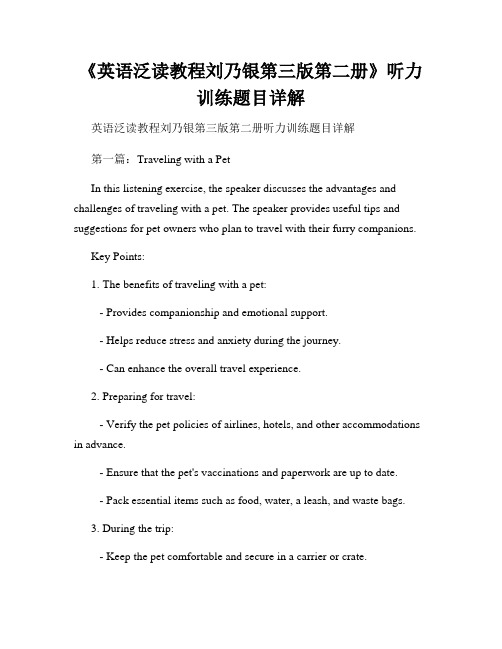
《英语泛读教程刘乃银第三版第二册》听力训练题目详解英语泛读教程刘乃银第三版第二册听力训练题目详解第一篇:Traveling with a PetIn this listening exercise, the speaker discusses the advantages and challenges of traveling with a pet. The speaker provides useful tips and suggestions for pet owners who plan to travel with their furry companions.Key Points:1. The benefits of traveling with a pet:- Provides companionship and emotional support.- Helps reduce stress and anxiety during the journey.- Can enhance the overall travel experience.2. Preparing for travel:- Verify the pet policies of airlines, hotels, and other accommodations in advance.- Ensure that the pet's vaccinations and paperwork are up to date.- Pack essential items such as food, water, a leash, and waste bags.3. During the trip:- Keep the pet comfortable and secure in a carrier or crate.- Take regular breaks for exercise and bathroom breaks.- Be mindful of the pet's behavior and adjust travel plans accordingly.4. Safety precautions:- Never leave the pet unattended in a parked vehicle.- Use a pet ID tag with current contact information.- Consider microchipping the pet for added security.5. Alternative options:- If traveling with a pet is not feasible, consider pet sitting services or boarding kennels.- Some hotels and resorts offer pet-friendly accommodations.Listening to this exercise helps pet owners gain a better understanding of the necessary preparations and safety measures when traveling with their pets. It emphasizes the importance of ensuring the well-being and comfort of the pet throughout the journey.。
- 1、下载文档前请自行甄别文档内容的完整性,平台不提供额外的编辑、内容补充、找答案等附加服务。
- 2、"仅部分预览"的文档,不可在线预览部分如存在完整性等问题,可反馈申请退款(可完整预览的文档不适用该条件!)。
- 3、如文档侵犯您的权益,请联系客服反馈,我们会尽快为您处理(人工客服工作时间:9:00-18:30)。
6. b 7. d 8. b 9. d 10. b
11. c 12. d 13. d 14. b 15. d
Saving time , energy for sth else;
We hold these truths to be self-evident, that all men are Created equal, that they are endowed by their Creator with certain unalienable Rights, that among these are Life, Liberty and the Pursuit of Happiness.
To laugh at oneself, at one’s own faults, one’s own sports: From the Humor: Self-deprecationfilures and embarrassments, even at one’s own ideals follow the rules; showgenerosity to one’s opponent and good temper in defeat; Never hit a man when he’s down. Never take advantage of another perso misfortune
Privacy
The oldest democracy and the monarchy.
Traditional
Greetings
For Birthday, Christmas, Valentine’s day, Mother’s day. Father’s day, Easter, Wedding Anniversary, Good Luck, New baby, etc.
Consideration for others
Selfdiscipline Little noisy behavior, and no loud disputing in the street; People in queues.
Tea
Where there is tea, there is hope.
The USA is reputed to be a classless society. A manual worker is usually quite at easy in any company. This is partly explained by the fact that people of all income groups go together to the same school. The Americans are far more race conscious than they are class conscious.
Tea break, two times /day; Morning tea (10:30AM) and afternoon tea (16:00/17:00); Tea with milk, or a little sugar; or with Lemon; Tea party.
There is no place like home. My house is my castle.
However, the Chinese, the smartest, has escaped already...
The British
Less talk, less emotion, less excitation Examples: by bus, by train Unwillingness to Scottish: generosityothers Except communicate with and hospitality I’m not bad Modesty: Sefl-deprecation Reserve
What is the British like?
Reserve
Politeness
Selfdiscipline
Tea
Privacy
Traditiocan
There is no single pattern of American character any more than there is a single English or Turkish or Chinese Character. Work hard Play hard
Entertainment
Social services
Individualism
Conformist
Big wheel
Little man
Success as a goal The bigger his management, the more successful he is judged to be; Strive for success, take advantage of opportunities to achieve success; The success brought a great deal of opportunities to the public;
Unit 2 Character
The Frenchman a British, a Frenchman, a lovers, and For some reason,has been busy phoning his Germansaid a Then the British askedand dated with the mostbest dress, one for goodbye inextricably his family to bring his beautiful cane Chinese were sentenced to death by hanging. Coincidentaly, on the last and hat, and the most romantic time. took a walk around the like a real gentleman, he the day of execution, something is wrong with the gallows, and prison with his cane, then returned to his room, tasted a glass the execution brought a tool box to the judge, and said "Your The German was postponed for one day. The judge informed of classic whiskey, and waited for the end of his life the criminals ofmy familytoldbring the tool box, and I think use honor, I asked this, and to them that they can make full I respectably the gallows in 2 hours, and the execution can go on". and quietly. will repair as they like. of this day
5. Newspapers Reading: Headlines words 1) Short words; 2) Abbreviations; 3) Shortened words and slang
6. Fast reading (15 minutes) Keys: 1. d 2. b 3. b 4. d 5. c
3. Text Keys:
A. b
B. 1.d 2.d 3.b 4.c 5.d 6.c 7.c 8.a
D. 1.b 2.a 3.d 4.d 5.a 6.c 7.a 8.a 9.c
4. New words: 1) compartment: a smaller, enclosed space inside sth larger 2) conceited: having too much pride in yourself 3) self-deprecation: self-disapproval 4) breach: an act of breaking a law, etc.. 5) artificially: in the way made by man
Politeness
Excuse me, sorry, pardon, thank you, Never say “no” Will you please… Would you mind … Consideration for others I don’t really like asking you, but… I know the trouble I’m causing you, but would you mind…? Ladies first Hold a door open Invitation Old people first Give up one’s seat to a woman; Open doors for her, Carry things for her ; Protect her from the traffic
Competitive;
Love;
Play as work;
Agressive;
Jack-of-all-trades;
Materialism
Idealism
Loving and hoarding wealth;
Making and consuming wealth;
Material comfort.
